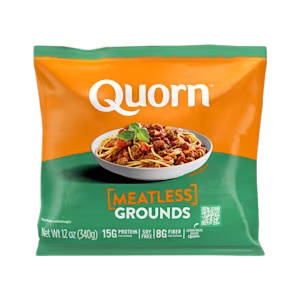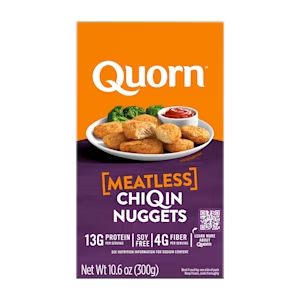Why Quorn Mycoprotein?

Staying healthy is important for us all and here at Quorn we like to help you do that in the easiest and tastiest way possible. You need not look any further than Quorn mycoprotein. It’s simply one of the best sources of non-animal protein there is, providing all nine essential amino acids. It’s also a good source of fiber, low in saturated fat and has a number of vitamins and minerals. It’s nutritious and sustainable – it’s the future of food.


Protein that packs a punch
Quorn mycoprotein packs a powerful punch of protein, which is an important part of a healthy diet. Proteins are made of amino acids, nine of which are essential, meaning the body can’t make them itself. This is why getting protein from the foods we eat is so important – it’s essential for growth and maintenance of bone and muscle. Quorn mycoprotein is a complete protein as it contains all nine essential amino acids. Other complete proteins include cow’s milk, chicken and fish, but animal proteins can be higher in saturated fat. But how does Quorn mycoprotein stack up against animal protein? Amazingly, university researchers[1] found that study participants who consumed Quorn mycoprotein increased their muscle protein synthesis rates (which aids muscle growth) twice as much as participants who had milk protein instead!
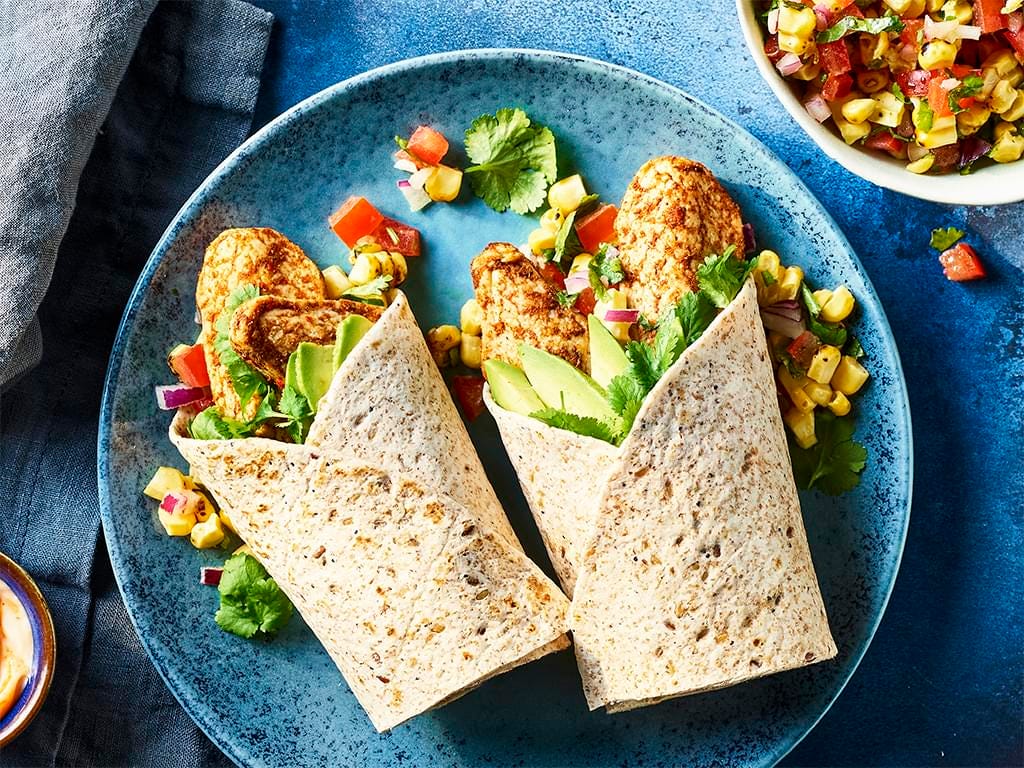

Fantastic fiber
If you get your protein from animal products, you’ll get far less fiber than you would from Quorn mycoprotein. Quorn mycoprotein, grains, beans, legumes, fruits, and vegetables are all good sources of fiber. Eating plenty of fiber is good for your health since it plays a major role in digestion and gut health – something we could all do with a bit more of.


Keeping an eye on fat
Quorn mycoprotein is low in total and saturated fat and contains no cholesterol. Fat isn’t all bad, it contains essential fatty acids that our bodies need but don’t make. Not too much mind, especially saturated fats as they can raise bad cholesterol, increasing the risk of heart disease. Animal meat is often high in saturated fats, so swapping out meat for Quorn mycoprotein is a no brainer to lower the amount of saturated fat in your diet.
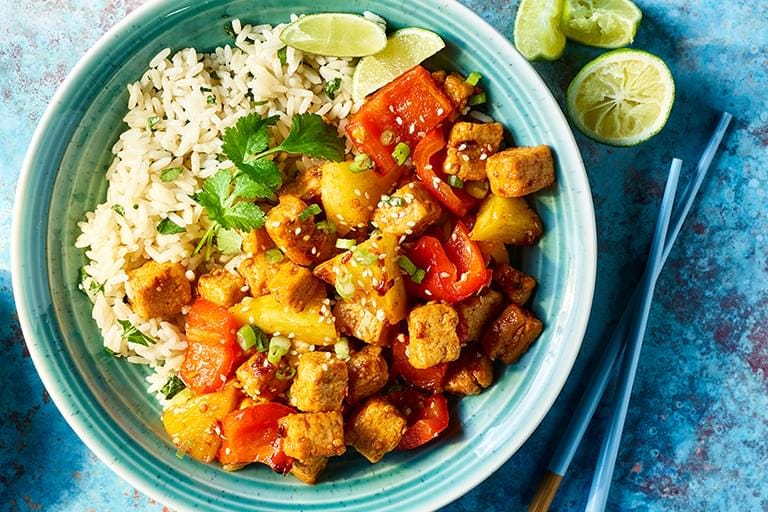

Micro magic
Vitamins and minerals are micronutrients, which means our bodies don’t need a lot of them, but they are incredibly important for a whole range of functions to keep us ticking along nicely. Quorn mycoprotein contains a range of vitamins and minerals including folic acid, zinc, selenium, manganese and choline.
Does good, tastes good
We all want to eat better and help the environment if we can. It’s not hard, really. We don’t have to reinvent the way we eat, just change what we eat. A simple swap to incorporate Quorn mycoprotein into your mealtimes is easy, and your favorite dishes will be just as delicious.
Quorn mycoprotein is a nutritious, sustainable source of protein. Producing Quorn mycoprotein uses 60% less water, emits 70% less carbon and uses 75% less land than chicken production[1]. By choosing Quorn, you’re not only eating better, but you are also helping the environment around you too. What’s not to like about that? Learn more about the environmental benefits of Quorn mycoprotein.
Data sources: 1. Quorn Footprint Comparison Report (the Carbon Trust, 2023)
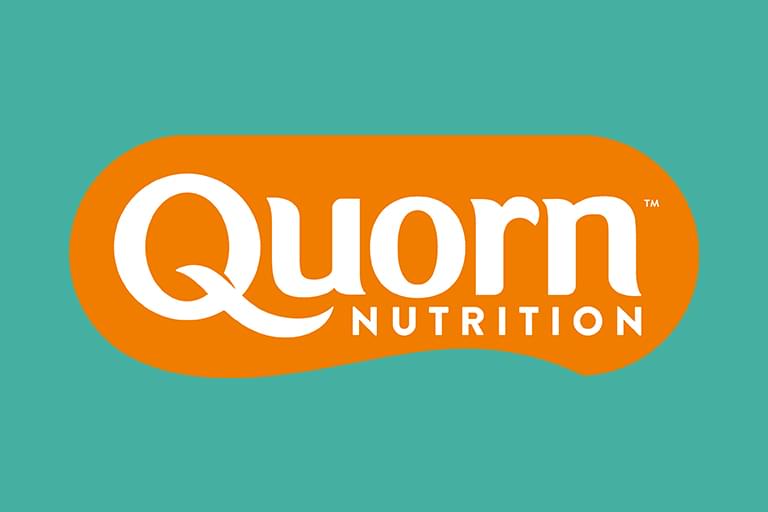
Healthcare Professionals
Are you a healthcare professional looking to find out more about Quorn mycoprotein?
Products
It's easier to help the planet when it tastes great too. See for yourself with our delicious range and make a change to your plate today.
See all products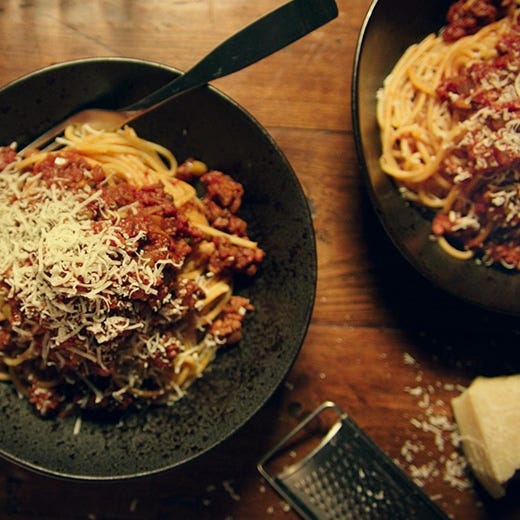
Take that beef
Quorn Spaghetti Bolognese has 90% less saturated fat than a beef version†[1]
Data sources: † Global average, 1. McCance and Widdowson (2019)

FAQs
See all FAQsWhat is Quorn mycoprotein?
Quorn mycoprotein is used as an ingredient in all Quorn products. It is made from a natural, nutritious fungus, and is high in protein, high in fiber, low in saturated fat and contains no cholesterol. Producing Quorn mycoprotein requires 90% less land, water and carbon emissions than producing animal proteins, so it's also good for the health of our planet.Learn more about mycoprotein.
Are Quorn products healthy?
Quorn mycoprotein, an ingredient in all Quorn products, is a unique and nutritious protein that can form part of a healthy, balanced diet. It is high in protein, high in fiber, low in saturated fat and contains no cholesterol.
This high-quality protein contains all nine essential amino acids that are not produced in the body and must be obtained through the food we eat. Quorn mycoprotein contains a variety of vitamins and minerals, it is a source of riboflavin and is high in choline, folate, manganese, phosphorus and zinc.
Does Quorn have a vegan line?
We have a variety of Quorn vegan products, which you can view on our Vegan Products page.
Are Quorn products gluten free?
Explore our full range of gluten-free Quorn products. You can also check out our recipes for gluten-free meal inspiration.
How do I cook Quorn?
Recommended cooking instructions for all Quorn products can be found on the back of each package and on the product page. For best results, we’d recommend that you follow these tried and tested instructions. If you choose to cook Quorn a different way, then please make sure it is piping hot all the way through before enjoying. If you’re looking for some tasty meal inspiration, why not try one of our recipes.
Can you reheat Quorn?
Quorn is perfectly safe to reheat, so long as it has been kept nice and cool in the fridge and is eaten within 48 hours. Please ensure that the food is piping hot throughout before serving, and remember, don’t reheat more than once.

